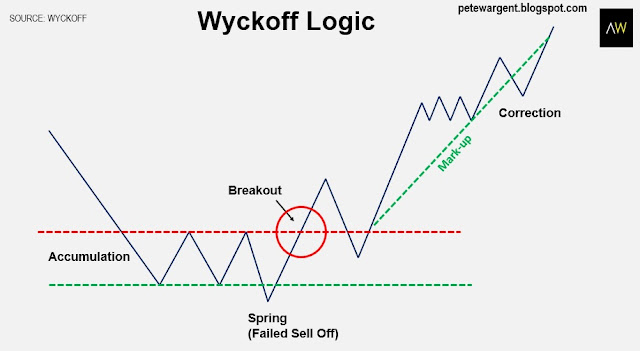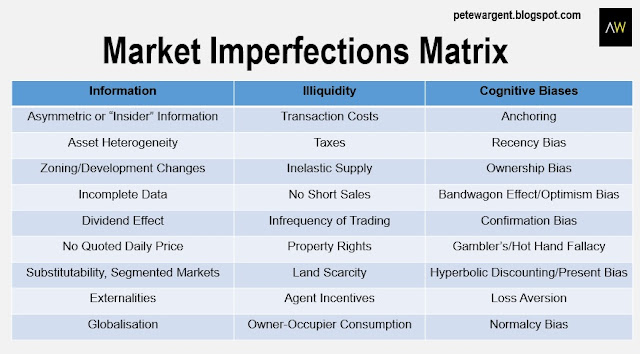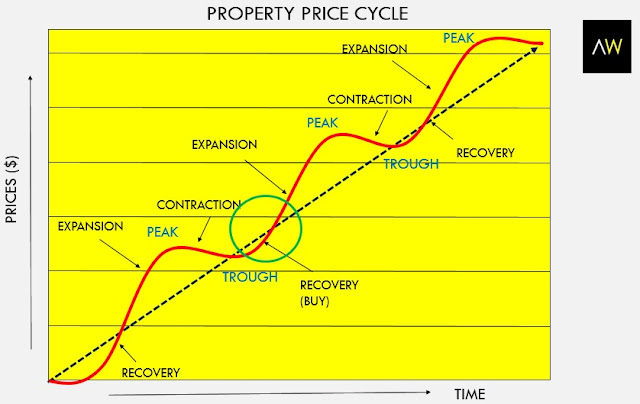Do you understand the difference between rational and imperfect markets?
In a perfect capital market, the Efficient Market Hypothesis (EMT) states that all publicly available information is instantly priced into a security by rational investors.
The perfect capital market doesn't quite hold true, for a number of reasons.
There are transaction costs and taxes which impact decisions, for example, while instances of insider trading forever stand as evidence that there is not equal access to market information by all participants.
Yet for most average investors, it is wise to assume that share prices are rationally priced most of the time, which is why it is difficult to consistently beat the average returns of the market using a value investing approach without a reasonably high level of analytical skill.
Others aim to profit from the market by trading, although the rise of High Frequency Trading (HFT), algorithms, and trading programs mean that this is also a very challenging way in which to earn a crust.
There is no shortage of people selling trading systems, but logically there is no one system that is guaranteed to beat the market, and if there was then any such advantage would soon be arbitraged away. 
At share trading seminars there will always be groups which for a fee promote strategies such as selling puts and calls a month from expiry, a couple of standard deviations away from the share price (a high win rate, sure, just don't mention the risk...)
There are a great many technical strategies that can be used to tackle the share markets.
Some to look to buy breakouts, others have software which alerts them to stocks which have broken new highs - after all, any share price which is going to really blow off must logically break to a fresh high before it can do so.

Share markets are an investment asset class, but while there are always long term holders of stocks, over the short term prices are often determined by traders and speculators.
And although share markets are not always perfect or rational, since the market is ultimately made up of investors, if you are looking to buy a stock, you would be wise to always consider three times why another market participant wants to sell it to you!
Real estate and imperfect markets
The definition of a perfect market holds that information is available equally and at the same time to all market participants, while the "law of one price" implies that a buyer and seller should be able to agree upon a market value.
However, unlike currency or stock markets, these rules don't apply so readily to residential property - being heterogeneous, segmented, infrequently traded, and with no daily quoted market prices, real estate is the most imperfect market of all.
Indeed, there are many more sources of imperfections and market failures in residential real estate than I can cover in one blog post, though some of the major factors are identified in my matrix below.

Investors like that real estate is an imperfect market, particularly given that a quick sale can rarely be made at market value.
Can property market analysts make more informed investment decisions than most market participants? 
Possibly, yes, particularly once they have experienced a few market cycles.
Periodically there are also motivated vendors, while experienced investors can add value to properties, or put them to their highest and best use.
Do expert property investors know more about the property markets they buy in than the vendors?
Again, possibly so.
Yet on the other hand when it comes to a property transaction the seller necessarily knows a good deal more about the individual asset and its defects than the prospective buyer can, in the same way that a used car salesman might profit from knowing the strengths and faults of a second hand motor.
Market imperfections in action
A homeowner bought a house for $700,000 plus stamp duty (taxes) and other costs in inner ring Brisbane in 2007, and has lived there ever since (infrequently traded).
The owner has wanted to trade up to a larger family home for some time, but after the Brisbane floods and a protracted lull in the market he was reluctant to sell for less than he paid for the house (loss aversion, anchoring), and in fact he wanted to sell for at least $730,000 in order to cover the other fees and charges of buying and selling (transaction costs).
In early 2015 he finally decided to put the house on the market with an asking price of $750,000, which he felt to be fair value, albeit an optimistic $10,000 above his selling agent's appraisal (ownership bias).
Although he felt that the market should definitely now poised for further capital growth, since he was planning to buy and sell in the same market, as a homeowner he would largely be unaffected by this (owner-occupier consumption).
In any case, after nearly eight years of little or no capital growth he had begun to lose faith in the market's potential to deliver further worthwhile growth (recency bias), and he knew there was a pest issue with white ants which would need attending to, hopefully by a new buyer (asymmetric information)!
An investor liked the look of the house and noted that the suburb was gentrifying, with several houses in the street having been recently renovated or developed (externalities), while he felt that being on a large plot there may be development potential through replacing the property with townhouses in the future (zoning).
Chinese buyers had reportedly been buying in the suburb (globalisation).
Although he had no idea how many houses in the street were owned by landlords, how much they rented for, or vacancy rates in the locality (incomplete information), he thought that the house was worth probably around $740,000.
He made an offer of $730,000, and although the selling agent had previously garnered some notional interest at around the $740,000 level, being paid on percentage commission the agent was keen to make a quick sale, and advised the vendor that he should sell at $735,000 (agent incentives).1

The buyer was happy to meet the counter-offer, particularly as it was $15,000 less than the initial asking price (anchoring).
The vendor found a new, larger house in the same suburb, and both buyer and seller benefited from rising house prices in 2015.
Finding market imperfections 
Real estate is unique as both a consumption and investment good, and as such even in markets which are poised for growth there are often willing vendors.
Buyers need access to full market information in order to make an appraisal of the market value of a property, and must also carry out detailed research into which suburbs and property types are likely to demonstrate growth.
1 - A sizeable study cited by Steven Levitt in the book Freakonomics claimed to show that real estate agents on average were prepared to list their own homes for longer than those of their own clients, and in doing so reportedly achieved prices for themselves several per cent higher than those achieved for their clients' homes.














